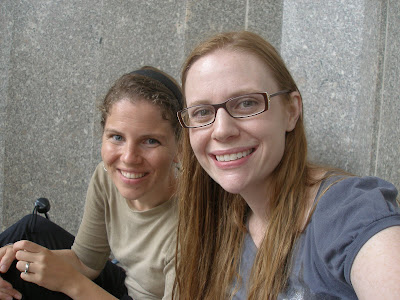 Stephanie and I taking cover during a rainy day visit in NYC
Stephanie and I taking cover during a rainy day visit in NYCI have many talented friends in the art history world. Art historians are a fun bunch; they are knowledgeable about the past, often seasoned travelers, and have a soft spot for old, pretty things. I wanted to interview my friend, Stephanie, who is an old BYU comrade. One thing that I have always admired about Stephanie is her passion for art acquisitions. As long as I've known her, Steph has always had her eye out for interesting artists or artworks that are going up for auction. This is a different kind of way to research art--it's easy to research such familiar names as Vermeer or Botticelli, but much more difficult, and perhaps more intriging to find information on a lesser-known, local artist. She inherited her love of art and art collecting from her father, and is now passing it along to her own daughters. Here are some great thoughts from Steph:
I really admire the way you and your family make art and art history such a big priority in your lives, especially the thrill of the hunt! How did your parents initially get interested in collecting? Were they also art historians? When did your dad start to include you in his pursuits? (I seem to remember you always involved in some research for a piece that he is looking at buying)
I was born in the same small midwest town as my father and grandfather. There were very few high-brow cultural resources in Sioux Falls, South Dakota, especially when my dad was growing up. Yet, my dad is a totally self-taught art collector, dealer and enthusiast. As a child he would go to the library and thumb through art books, initially loving the Greek and Roman periods. Neither of my dad's parents went to college or had any interest in art history but they were incredibly supportive of his interests and took him to museums whenever possible - even driving 5-6 hours to visit the Joslyn Museum in Omaha or the museums in Minneapolis. My dad started collecting late 19th and early 20th century American art in college. During his years at BYU he would spend Saturdays in Salt Lake at the galleries looking at paintings that he couldn't afford on a student budget (at the time those paintings were priced at a few hundred dollars and today they are worth tens of thousands of dollars, and in some cases hundreds of thousands!) My dad graduated from law school and became an estate attorney but he ALWAYS said that his true love was art collecting and art dealing. During law school my dad purchased 2 huge paintings that he still owns and my grandfather helped him rent a box truck and they drove the few hours together to pick up the paintings. Retelling that story always gets my dad teary-eyed - my grandpa was a supportive father and friend to my dad. The moral of the story here is that parents have a great opportunity to support their children's interests, as diverse or far-fetched as they may be.
Some of my earliest childhood memories are of attending local auctions and estate sales with the auctioneer "calling" in the backround (that's what the strange auctioneer language is called). My parents took us everywhere with them as my dad hunted for interesting art and antiques.
Art filled the walls of our home and nearly all of the furniture, tables and lamps were antiques. My brother and sister and I were taught from an early age to be respectful of the things in our house and to take special care of them - basically, don't break the old stuff!
I started researching paintings for my dad in college when I majored in art history. The University libraries were full of invaluable art research tools - books, electronic search engines, etc that are only available to students (I miss those tools now - I've had to figure out other ways to access the info that was so readily available to students and faculty).
Another cool thing I like about you is that you are from South Dakota, and, from what I've noticed, you are loyal to your midwest roots and still very cosmopolitan. As you grew up, how did you develop both a love for home and for everywhere else?
As you are a mother now, how do you see yourself incorporating (or not!) art into their childhood worlds? I don't know about you, but I often feel my art history part of me taking the back burner to the day-to-day life of mothering tiny kids. (This next question particularly applies to when you don't have a newborn) What do you do to keep a foot in the museum door?
First of all, I think that children naturally LOVE the humanities: literature, art, music, dance. What child doesn't love finger painting, coloring, play-dough, singing or reading books? To me, this innate interest is proof of the essential nature of art to the human experience. Picasso said, "All children are artists. The problem is how to remain an artist once he grows up." With that, I never deny my 3 year-old daughter's requests to draw or color (but play-dough is something I reserve for daddy time :). I prefer she use plain paper and draw her own pictures instead of coloring books - it requires much more creativity to make your own image than color someone else's.
We also display all of her art - it's part of her ritual to take her drawing to the fridge as soon as she's done with it. This may sound simple, but it's important she be proud of her creations and know that we her parents are proud of them, too. We attend museums as much as possible - don't stay too long or make the experience laborious - but it's important she learn how to behave in a museum setting. We look for animals, shapes, etc in the images at museums, or I ask her what she thinks one of the abstract images means/feels like (I also try to do this with classical music on the radio - it started a while back when I was explaining one of Vivaldi's Four Seasons to her - that the music was representative of winter. Now she thinks all classical music "means" something - this requires more creativity on my part to try to come up with meanings for the music..) Finally, we have art on the walls of our home and try to teach her how to treat the art- don't touch the canvas, just look with your eyes, etc.
And, this one is especially for me: I am very intimidated but intrigued by the art auctioning; do you have any suggestions for me or anyone interested in collecting art about how to start breaking into the biz? What are your tips for budding collectors?
First of all, attend local auctions and estate sales in your area without buying anything. Just go to watch how it all happens - each auctioneer does it a little different (our local auctioneer gets annoyed with newbies who don't know the system at his auction). Then, when you see something you like, go for it!! The big dealers have been quoted saying that auctions are the new retail. With the internet it's possible to get access to auction records for most artists, though you usually have to pay a small fee to the online auction record sites for such info. The most affordable original art would be etchings, woodblock prints and other works on paper. They are usually under $150.
Also, frequent the junk shops and conseignment shops to get an idea for prices and things that interest you. My dad always says, buy what you love. Years ago I asked my dad how I could learn to tell a good quality painting from a mediocre one because at the time they all looked the same to me. He told me, "just keep looking. Your eye will develop the more you look." The "looking" IS the thrill of the hunt!
